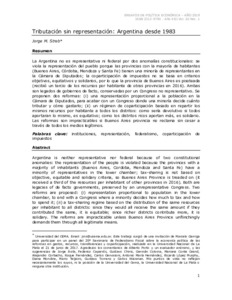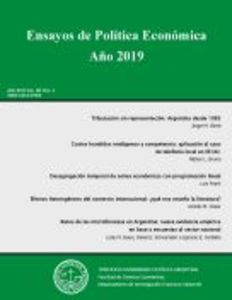Please use this identifier to cite or link to this item:
https://repositorio.uca.edu.ar/handle/123456789/9455| Título: | Tributación sin representación : Argentina desde 1983 | Autor: | Streb, Jorge M. | Palabras clave: | INSTITUCIONES; COPARTICIPACION FEDERAL; IMPUESTOS; FEDERALISMO; REPRESENTACION; ECONOMIA | Fecha de publicación: | 2019 | Editorial: | Universidad Católica Argentina. Facultad de Ciencias Económicas. Departamento de Investigación Francisco Valsecchi | Cita: | Streb, J. M. Tributación sin representación: Argentina desde 1983. [en línea]. Ensayos de Política Económica. 2019, 3(1). Disponible en: https://repositorio.uca.edu.ar/handle/123456789/9455 | Resumen: | Resumen: La Argentina no es representativa ni federal por dos anomalías constitucionales: se viola la representación del pueblo porque las provincias con la mayoría de habitantes (Buenos Aires, Córdoba, Mendoza y Santa Fe) tienen una minoría de representantes en la Cámara de Diputados; la coparticipación de impuestos no se basa en criterios objetivos, equitativos y solidarios, por lo que la provincia de Buenos Aires es pisoteada (recibió un tercio de los recursos por habitante de otras provincias en 2016). Ambas son legados de gobiernos de facto, conservadas por un Congreso no representativo. Se proponen dos reformas: (i) una representación proporcional a la población en la Cámara de Diputados, para acabar con un Congreso donde una minoría decide cuánto tributar y cómo gastarlo; (ii) un régimen de coparticipación basado en repartir los mismos recursos por habitante a todos los distritos: como sería devolutivo si todos aportaran lo mismo, es equitativo; como los distritos ricos aportan más, es solidario. Las reformas son impracticables si Buenos Aires provincia no reclama sin cesar a través de todos los medios legítimos. Abstract: Argentina is neither representative nor federal because of two constitutional anomalies: the representation of the people is violated because the provinces with a majority of inhabitants (Buenos Aires, Cordoba, Mendoza and Santa Fe) have a minority of representatives in the lower chamber; tax-sharing is not based on objective, equitable and solidary criteria, so Buenos Aires Province is treaded on (it received a third of the resources per inhabitant of other provinces in 2016). Both are legacies of de facto governments, preserved by an unrepresentative Congress. Two reforms are proposed: (i) representation proportional to population in the lower chamber, to end with a Congress where a minority decides how much to tax and how to spend it; (ii) a tax-sharing regime based on the distribution of the same resources per inhabitant to all districts: since they would all receive the same amount if they contributed the same, it is equitable; since richer districts contribute more, it is solidary. The reforms are impracticable unless Buenos Aires Province unflinchingly demands them through all legitimate means. |
Cobertura Espacial: | Argentina | Cobertura Temporal: | 1983 | URI: | https://repositorio.uca.edu.ar/handle/123456789/9455 | ISSN: | 2313-9781 2313-979X (on line) |
Disciplina: | ECONOMIA | Derechos: | Acceso abierto | Fuente: | Ensayos de Política Económica Año XIII, Vol. III, N° 1, 2019 |
| Appears in Collections: | ENS - 2019 |
Files in This Item:
| File | Description | Size | Format | |
|---|---|---|---|---|
| tributacion-sin-representacion-1983.pdf | 759,89 kB | Adobe PDF |  View/Open | |
| ensayos2019.jpg | 4,69 kB | JPEG |  View/Open |
Page view(s)
532
checked on Feb 11, 2026
Download(s)
386
checked on Feb 11, 2026
Google ScholarTM
Check
This item is licensed under a Creative Commons License

